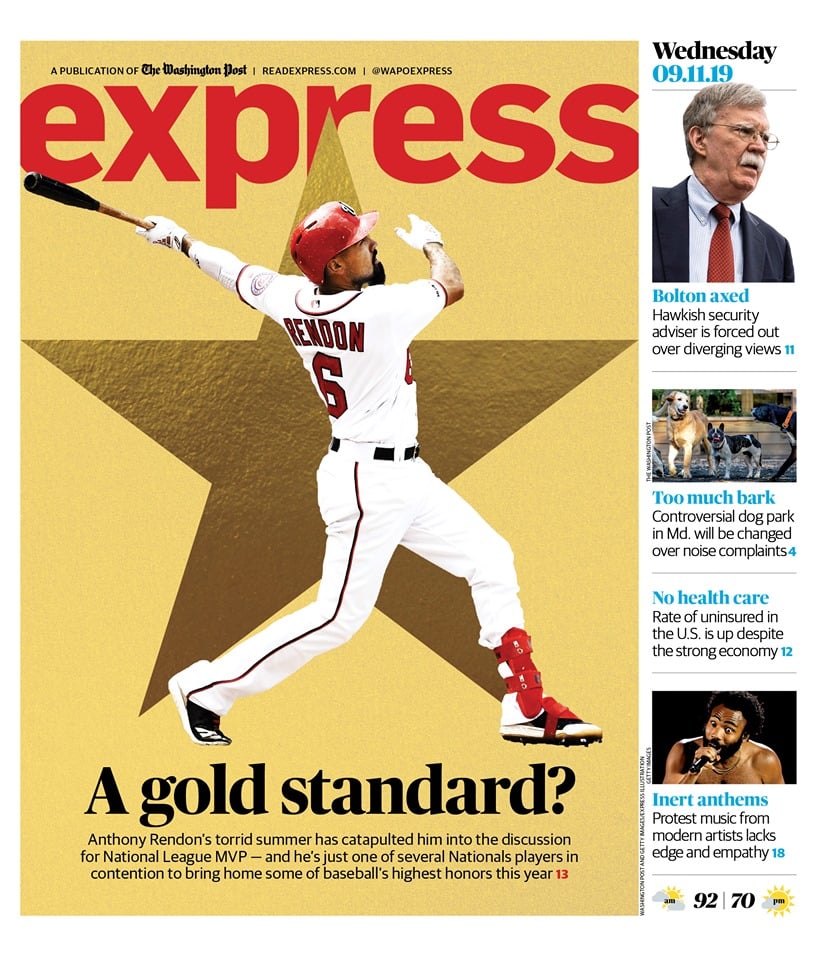When the Washington Post launched Express in 2003, Washington City Paper stunk up its rollout with a one-off parody called Expresso. City Paper, whose staff I joined three years later, got a preview of Express‘s logo thanks to some “skulduggery,” remembers the paper’s then “Webmeister” and architect of the parody, Dave Nuttycombe, and the alt-weekly had hawkers out at Metro stations wearing yellow T-shirts and passing out the spoof paper, which had a print run of 10,000 and cost north of a buck a copy to produce. “Half the Content, Twice as Free,” the parody’s motto read. It included a person-on-the-street “What are you reading?” feature to which every answer was some variant of “the Harry Potter movie” and a crossword puzzle that was partly filled in, offering “unchallenging fun for younger nonreaders.”
https://twitter.com/nutco/status/1085750926680485889
Express was aimed at “a younger, busier crowd that may not be in the habit of tackling the daily newspaper,” Joshua Partlow wrote in the Post‘s August 5, 2003, coverage of the tabloid’s launch the day before. The Post‘s print circulation was dropping, Partlow reported, and its executives hoped this would be a cheap way to find younger readers: “Because newspapers generally receive 75 percent of their revenue from advertising,” Partlow wrote, “analysts said it can be cost-effective to give away a newspaper such as Express that is able to keep down costs by keeping editorial staff at a minimum.”
Sixteen years later, the Post figured out how to really keep editorial costs down at Express—Thursday’s publication will be its last. The Post says WiFi in the Metro has made it easier for riders to read on their phones instead, and falling ridership on Metro hasn’t helped matters. But at the time, Express was a solid bet for a print-focused industry whose business model’s reckoning was still five years away. You could read some stuff on a phone at the time, but it was a cumbersome and slow experience. Express offered short news summaries, fun gossip, and puzzles that shortened your ride. Most of us have shared a seat with a copy at some point.
Express was part of a wave of similar tabloids in other cities. Red Eye in Chicago, AM New York, *tbt in Tampa/St. Petersburg, Metro all over the world—they were all predicated on the idea that the best way to reach young people not interested in your print newspaper was to launch a separate, more fun, and, most important, free print newspaper. And for a while it worked. 2007 was Express‘s best year for circulation, Executive Editor Dan Caccavaro told the Post, with the tabloid’s circulation at around 190,000. Average circulation in the second quarter of 2019 was 125,944 in Express’ most recent report with the Alliance for Audited Media, down 16 percent from the same period in 2015. Excluding Post Marketplace, the Washington Post‘s print average weekday circulation fell even harder: from 382,377 in the second quarter of 2019 to 237,638 this year—a 37 percent drop.
But the Post has something Express never managed to wrangle–an enormous online readership of its own. Almost 84 million people visited the Post last month, a rise of more than 16 percent over the previous year. Much of that audience is national—though Express content eventually got published on the Post‘s site after stays on other URLs—and therefore presumably uninterested in the infotainment needs of DC-area commuters.
The Post says it plans to ease the sting of Express‘s absence by offering a “60-day, free trial for unlimited digital access to The Washington Post.” That’s the kind of deal Express‘s 20-person staff, which learned they were losing their jobs during a meeting that coincided with the Post‘s announcement, could probably use. Express’s staff was not unionized, but the Washington Post Guild condemned the layoffs and the paper’s closure in a statement Wednesday. Noting that Express staffers returned to their desks after that meeting to put out Express‘s final edition, the Guild wrote, “We hope Washington Post management will honor this dedication to our journalistic mission and find employment in our newsroom for our colleagues now without jobs.”
Asked about what sort of severance Express employees could expect and whether the Post was doing anything to help find them jobs within the company, a Post spokesperson told Washingtonian,“We don’t have anything additional to share.”




















